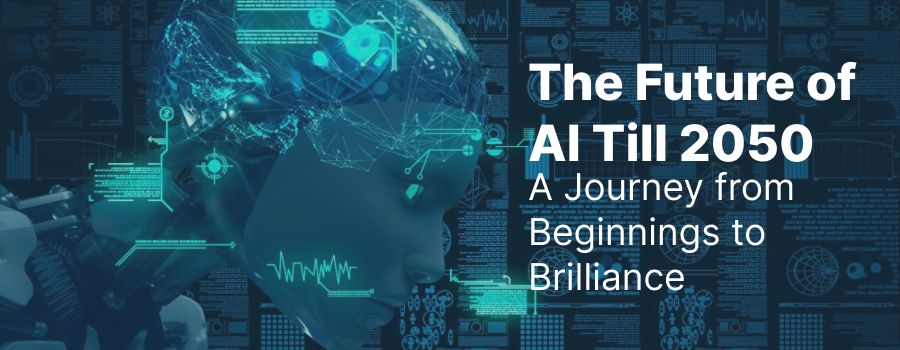Posted on: Jul 18, 2024
Estimated reading time: 0 minutes
The Future of AI Till 2050: A Journey from Beginnings to Brilliance

Let’s take a fascinating journey from the dawn of AI innovation to its future potential.
The Dawn of AI Innovation:
The Humble Beginnings: The story of AI began in the mid-20th century with pioneering scientists like Alan Turing and John McCarthy. These visionaries laid the foundation for what would become a transformative technology, sparking the imagination of generations to come.
Early Breakthroughs: Artificial intelligence (AI) has come a long way since its humble beginnings. From early breakthroughs in machine learning and neural networks to the current AI renaissance, from chess-playing computers to early speech recognition systems, the 1980s and 1990s witnessed AI making its initial foray into the real world.
The AI Renaissance: The early 21st century witnessed a resurgence in artificial intelligence, and advancements in AI technologies, leading to a renewed interest and transformative impact across various sectors.
The Present: AI in Full Swing:
AI Today: Fast forward to 2024, AI is everywhere. AI technologies are becoming increasingly prevalent in our daily lives, from virtual assistants like Siri and Alexa to self-driving cars, facial recognition software, predicting climate changes, and even creating art. Companies across all industries are harnessing the power of AI to innovate and optimize their operations.
Everyday AI: In our homes, smart devices learn our preferences and routines, making life more convenient and efficient. In education, AI provides personalized learning, while in finance, it detects fraud. AI's presence is ubiquitous, transforming how we live and work. The possibilities are seemingly endless.
The Future: Vision 2050:
AI and Beyond: As we look towards 2050, the future of AI promises to be nothing short of extraordinary. Here’s what we can expect:
Superintelligent AI: By 2050, we may witness the emergence of superintelligent AI—systems that surpass human intelligence in all respects.
From healthcare to finance, AI algorithms are enhancing decision-making processes, boosting efficiency, and unlocking new growth opportunities. With developments in natural language processing, computer vision, and robotics, the potential applications of AI seem boundless. Stay tuned for insights on how these advancements are shaping our world.
Ethical AI:
Transparency: The AI system must be transparent in its decision-making process, providing clear reasons for why a certain action or decision was taken.
And also, Ensuring AI systems are free from biases that could lead to unfair treatment or discrimination too.
Fairness: The AI system must ensure that all individuals are treated fairly, without discrimination or bias based on factors such as race, gender, or socioeconomic status.
Safety: The AI system must prioritize the safety and well-being of individuals, ensuring that any decisions or actions taken do not pose harm to individuals or society as a whole.
As AI evolves, so too will the discussions around its ethical use. Ensuring that AI development is aligned with human values and safety will be paramount. Transparency, accountability, and ethical considerations will shape the future landscape of AI.
Challenges and opportunities ahead:
As we stand on the precipice of AI innovation, we must acknowledge the challenges and opportunities that lie ahead.
Amidst the promise of groundbreaking advancements, critical issues such as bias in AI algorithms, job displacement due to automation, and the ethical implications of AI decision-making processes require our immediate attention.
We have challenges like, Ethical concerns, Security Risks, Job Deplacement, Dependence and Reliability etc, so we have to look out for AI, till 2050, and how AI will be involved in our day-to-day lives.
We have opportunities too, as we look into the future like Scientific Research, Education, transportation, Smart Cities, prediction of Climate change (environmental monitoring), Userful innovation etc ..
Conclusion: Embracing the AI Future?
The journey of AI from its nascent stages to its potential future is nothing short of awe-inspiring. As we stand on the brink of 2050, the promise of AI offers a blend of excitement and responsibility. Embracing this future means not only leveraging the incredible benefits of AI but also navigating the ethical and societal challenges it presents.
The future of AI is a story of human ingenuity and technological brilliance—a story that’s just beginning to unfold.
"AI doesn’t have to be evil to destroy humanity—if AI has a goal and humanity just happens to be in the way, it will destroy humanity as a matter of course without even thinking about it, no hard feelings."– Elon Musk